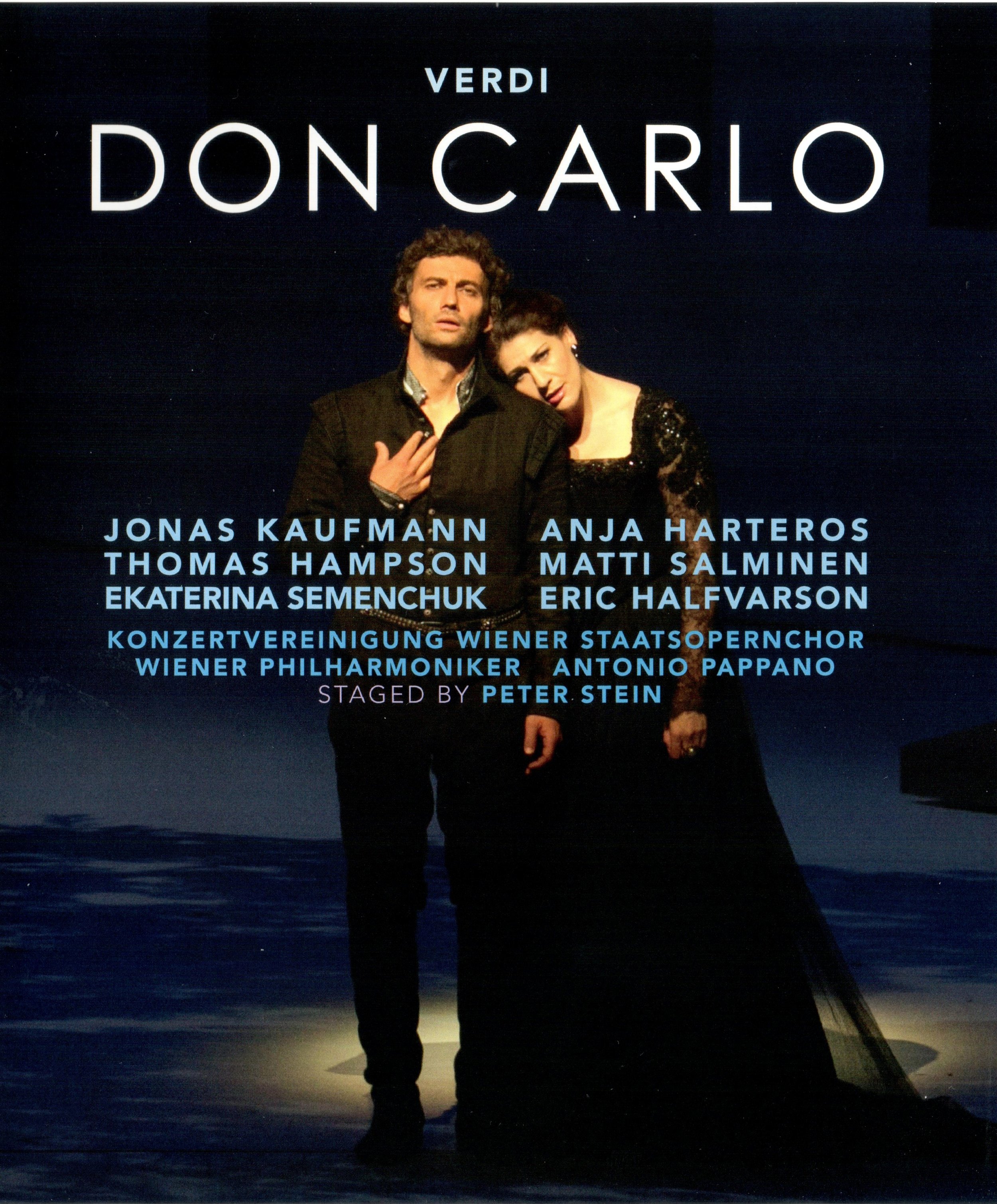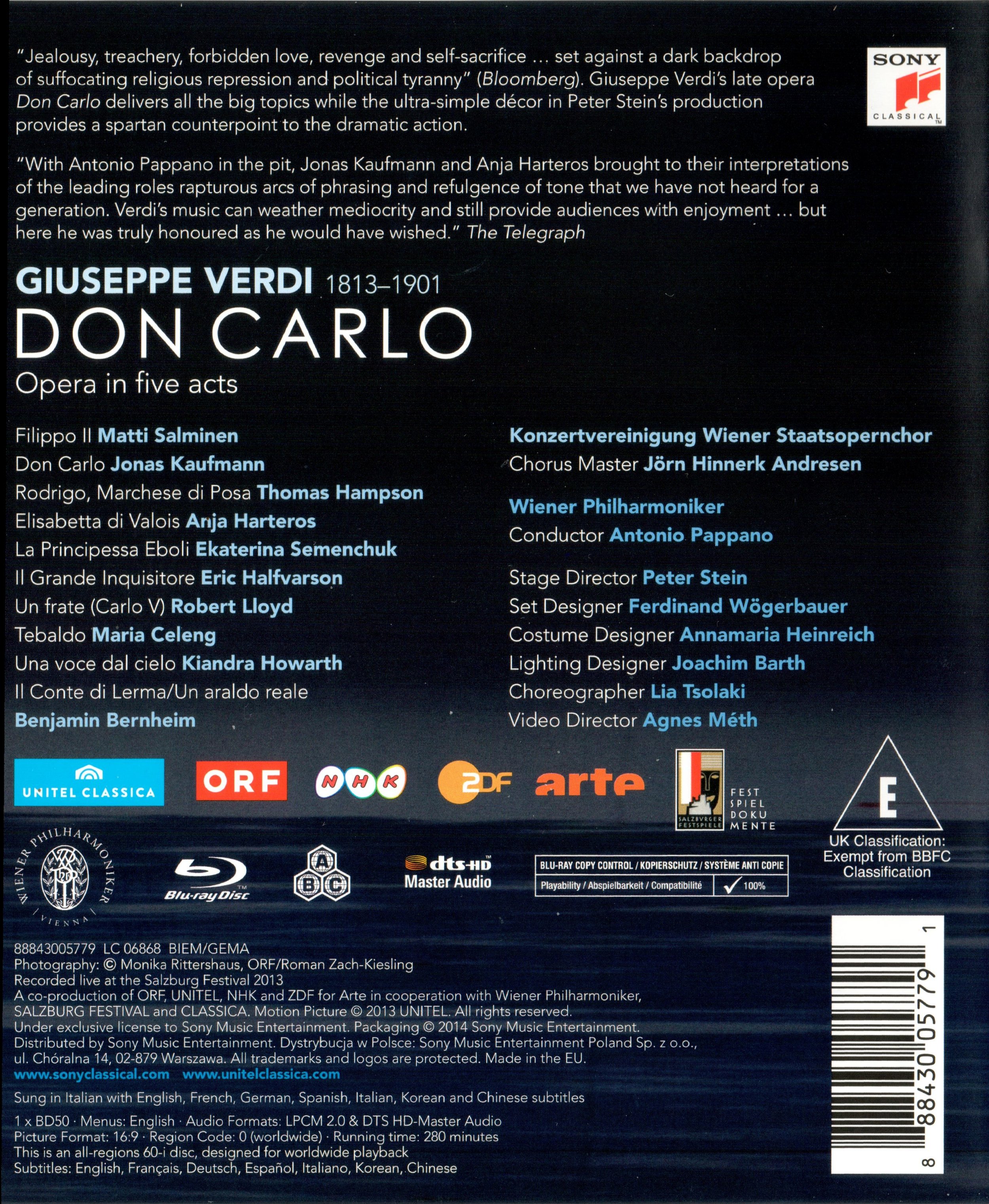

Verdi Don Carlo opera to a libretto by Camille du Locle and Joseph Méry. Directed 2013 by Peter Stein at the Salzburg Festival. Stars Matti Salminen (Flilppo II), Jonas Kaufmann (Don Carlo), Thomas Hampson (Rodrigo/Marchese di Posa), Anja Harteros (Elisabetta di Valois), Ekaterina Semenchuk (La Principessa Eboli), Eric Halfvarson (Il Grande Inquisitore), Robert Lloyd (Un frate/Carlo V), Maria Celeng (Tebaldo), Kiandra Howarth (Una voce dal cielo), Benjamin Bernheim (Il Conte di Lerma/Un Araldo reale), Antonio di Matteo, Peter Kellner, Domen Križaj, Roberto Lorenzi, Iurii Samoilov, Christoph Seidl (Sei deputati fiamminghi), Oleg Savran (Un boscaiolo), and Anna-Eva Köck (La Contessa D’Aremberg). Antonio Pappano conducts the Vienna Philharmonic and the Concert Association of the Vienna State Opera Chorus (Chorus Master Jörn Hinnerk Andresen). Stage music by Members of the Angelika-Prokopp-Sommerakademie der Wiener Philharmoniker. Set design by Ferdinand Wögerbauer; costume design by Annamaria Heinreich; lighting design by Joachim Barth; choreography by Lia Tsolaki. Directed for TV by Agnes Méth. Sung in Italian. Released 2014, disc has dts-HD Master Audio sound. Grade: A-
Don Carlo is Verdi’s longest opera. This five-act production, Verdi’s last of many revisions, dates to 1886. It was performed at the Royal Opera House between 2013 and May 2017 and Salzburg with Pappano, Kaufman, and Harteros. Don Carlo is perhaps the grandest opera in the canon dealing with statesmanship and politics and is full of ideas that seem surprising during the reign of a Spanish king who lived as absolute monarch between 1527 and 1598. These liberal ideas come from Friedrich Schiller, who wrote the famous German language play Don Carlos in 1787 (just two years before the outbreak of the French Revolution) upon which the opera is based. When you approach this opera live or on video, bone up on the libretto in advance and be sure to have a soft seat.
In our first screenshot we see Jonas Kaufman as Prince Don Carlo with the French Princess Elisabetta di Valois (Anja Harteros). They have been engaged to marry since childhood; here they meet by accident and actually fall in love:
But for political reasons, Elisabetta is forced to marry Don Carlo’s father, King Phillip II. So instead of having a new bride, Don Carlo has a new step-mother! But nobody else knows of their true feelings:
Next below we meet Rodrigo, a court official loosely based on the historical William the Silent, who defended the people of the Netherlands from Phillip II. In the opera, Rodrigo will become the sworn friend of Carlo and a confidant of the King, which will present conflicts of interest:
Princess Eboli (Ekaterina Semenchuk) is also in love with Don Carlo. She misunderstands why Carlo keeps hanging around the court:
The true lovers remain totally frustrated:
King Phillip II (Matti Salminen) justifies his harsh rule in a debate with Rodrigo:
Rodrigo responds with a famous speech (which in Schiller’s play has achieved a status similar to the speeches from Shakespeare or Abraham Lincoln in English):
Even the King fears the Grand Inquisitor:
Princess Eboli discovers the truth and is rejected by Carlo:
Eboli wants revenge on Elizabetta:
The reign of Phillip II spans the globe (the Phillipine Islands are named for him):
The PQ achieved by Agnes Meth in this video is unexcelled in 1080 TV:
The inquisition will burn heretics at the stake (standing with flags on a big stack of firewood in the background) at a royal celebration. Carlo crashes the event with ambassadors from Brabant and Flanders to plead without success for autonomy for the Netherlands:
The King, a neatness and control freak, laments that his wife doesn’t love him and that his son has become a threat:
His suspicions are inflamed by Princess Eboli, who eventually confesses to the Queen:
As the intrigues unfold, Rodrigo is doomed:
At the tomb of Carlo’s grandfather, Charles V, the lovers resign themselves to fate and hope to meet in heaven where:
Unlike the statute in Mozart’s Don Giovanni, the statute here comes to life and takes its supplicant to heaven. Critics find the ending of Don Giovanni completely logical and satisfactory; but critics have always objected to this ending of Don Carlo as flinching. This is a tragedy, so Carlo needs to die at the hands of the Inquisition (and maybe Elisabetta also):
The only thing to complain about in this production would be the sets, which are too plain and drab. One gets the impression that the Salzburg Festival spent their whole budget on singers, costumes, and props leaving meager funds for stage scenery. We happened to see this production live at the Royal Opera in May 2017 (with less famous musicians than here). To our memory, the sets were distinctly better in London than in Salzburg. This opera is expensive to produce with a lot of singing and acting roles. We think it benefits from a more sumptuous mise-en-scène than what was achieved at the Festival. But on the other hand, we may have to wait a long time to get a better Blu-ray of this work. Grade: A-.
OR


















